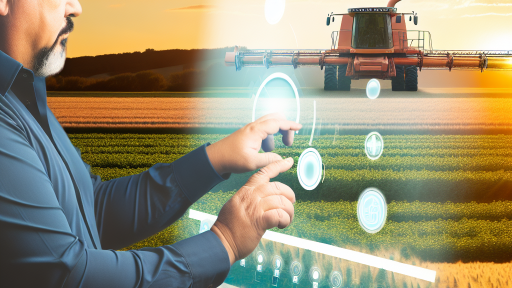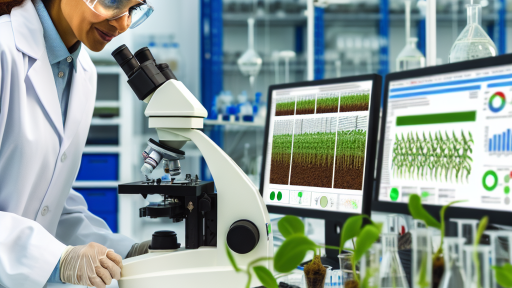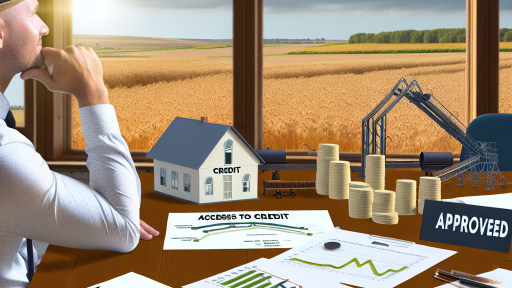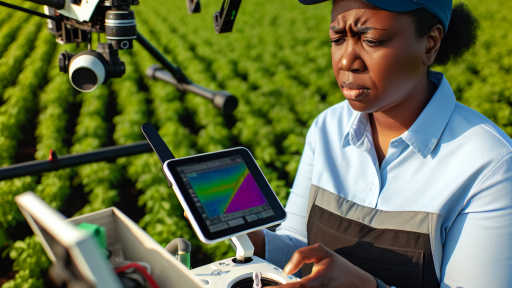Introduction to Blockchain Technology and Its Relevance to Agriculture
Understanding Blockchain Technology
Blockchain technology revolutionizes data management and security.
It creates a decentralized digital ledger, ensuring transparency.
Each transaction is recorded as a block in a chain.
This chain of information is secure and immutable.
Decentralization reduces the risk of data manipulation.
Consequently, businesses benefit from enhanced trust and reliability.
Benefits of Blockchain in Agriculture
Implementing blockchain technology addresses several agricultural challenges.
One key benefit is improved supply chain transparency.
This transparency helps trace products from farm to table.
Furthermore, it ensures that consumers receive authentic products.
Smart contracts automate transactions and reduce delays.
Additionally, blockchain enhances traceability during food recalls.
Blockchain and Food Safety
Food safety is crucial for consumer protection and public health.
Blockchain facilitates rapid identification of contaminated products.
This swift action minimizes health risks effectively.
Transform Your Agribusiness
Unlock your farm's potential with expert advice tailored to your needs. Get actionable steps that drive real results.
Get StartedMoreover, it allows stakeholders to verify compliance with safety standards.
In conjunction, it fosters accountability among producers and suppliers.
Challenges in Adoption
Despite its advantages, blockchain adoption faces challenges.
The initial setup costs can be prohibitive for small farmers.
Moreover, there may be a lack of understanding of the technology.
Establishing standards and regulations is also necessary.
Lastly, integration with existing systems is often complex.
Future Outlook
The potential for blockchain in agriculture remains promising.
As more stakeholders recognize its benefits, adoption will increase.
Collaborative initiatives can address current challenges effectively.
In turn, this technology can promote a more sustainable food system.
Ultimately, blockchain technology will redefine agricultural practices.
Current Challenges in Agricultural Supply Chain Management
Complexity of Supply Chains
Agricultural supply chains involve numerous stakeholders.
These include farmers, processors, distributors, retailers, and consumers.
Each participant plays a vital role in ensuring effective operations.
However, this complexity often leads to inefficiencies.
Lack of Transparency
The agricultural industry often suffers from a lack of transparency.
Farmers and consumers struggle to trace the origin of products.
This ambiguity raises concerns about food safety and quality.
Moreover, it complicates accountability among stakeholders.
Fraud and Counterfeiting
Fraudulent practices pose significant risks to agricultural supply chains.
Countersigned products can enter the market easily.
This undermines consumer trust and damages legitimate businesses.
Combatting this issue requires robust tracking mechanisms.
Showcase Your Farming Business
Publish your professional farming services profile on our blog for a one-time fee of $200 and reach a dedicated audience of farmers and agribusiness owners.
Publish Your ProfileInefficiencies in Communication
Communication gaps hinder timely decision-making.
Stakeholders may lack access to crucial information.
Delays often result in lost profits and reduced quality.
Efficient communication channels are essential for smooth operations.
Sustainability Concerns
Environmental sustainability is increasingly important in agriculture.
However, many supply chains still rely on unsustainable practices.
This contributes to climate change and resource depletion.
Shifting towards sustainable practices is crucial for future viability.
Market Fluctuations
Agricultural markets are highly susceptible to fluctuations.
Factors like weather, demand, and economic trends impact stability.
Stakeholders must adapt quickly to mitigate risks.
Effective risk management strategies can safeguard operations.
How Blockchain Enhances Transparency and Traceability in Agriculture
Understanding Blockchain Technology
Blockchain technology is a decentralized digital ledger system.
It enables secure and transparent recording of transactions.
Each transaction is stored in blocks, linked to form a chain.
This technology allows all participants to access the same information.
Increasing Transparency
Transparency is critical in agricultural supply chains.
Consumers desire to know where their food comes from.
Blockchain provides an immutable record of every transaction.
This helps to eliminate doubts regarding product origins.
Furthermore, it reduces the risk of food fraud.
Enhancing Traceability
Traceability refers to the ability to track products through the supply chain.
Blockchain enables real-time tracking of agricultural products.
This feature allows stakeholders to monitor products from farm to table.
In the event of a contamination, swift action can be taken.
Recall procedures become more efficient with accurate data.
Building Trust Among Stakeholders
Trust is essential for successful supply chains.
Blockchain fosters trust among producers, suppliers, and consumers.
Each participant can verify transactions independently.
This verification reduces reliance on intermediaries.
As a result, the entire process becomes more efficient.
Case Studies in Blockchain Implementation
Many companies have begun implementing blockchain in agriculture.
For example, Provenance uses blockchain for food sourcing.
They provide consumers with verified product histories.
Similarly, IBM’s Food Trust service enhances supply chain transparency.
These case studies demonstrate blockchain’s impact in real-world scenarios.
Delve into the Subject: Sustainable Farming Practices With GM Crops
Case Studies of Blockchain Implementation in Agriculture
Enhancing Supply Chain Transparency
Blockchain technology increases transparency in agricultural supply chains.
For instance, IBM’s Food Trust platform showcases a successful application.
This system allows consumers to trace the origin of their food products.
Showcase Your Farming Business
Publish your professional farming services profile on our blog for a one-time fee of $200 and reach a dedicated audience of farmers and agribusiness owners.
Publish Your ProfileConsequently, it builds trust between consumers and producers.
Retailers like Walmart utilize this platform to track leafy greens.
This ensures faster response times during food safety issues.
Such transparency reduces fraud and increases accountability.
Improving Payment Systems
Blockchain also revolutionizes payment systems in agriculture.
For example, the AgriLedger project enables farmers to receive payments instantly.
This initiative benefits smallholder farmers in rural regions.
By using smart contracts, payments are automated upon delivery.
Thus, it reduces the dependency on intermediaries.
Farmers experience quicker access to funds, improving cash flow.
As a result, they can reinvest in their farms more readily.
Streamlining Certification Processes
Another significant case involves environmental certification.
The company Provenance uses blockchain to verify product origin.
Consumers demand assurance that products are ethically sourced.
Provenance provides this verification through immutable records.
This process increases market access for small, sustainable producers.
By simplifying this certification, blockchain reduces costs and time.
Moreover, it encourages sustainable farming practices among producers.
Facilitating Data Sharing
Blockchain enhances data sharing among stakeholders in agriculture.
For instance, the platform FarmTrace connects farmers with agricultural processors.
This collaboration allows farmers to access crucial market data.
Through blockchain, data is secure and easily shared.
Stakeholders can make informed decisions based on real-time information.
This improves efficiency in production and reduces waste.
Furthermore, it fosters stronger partnerships across the industry.
Find Out More: Reducing Supply Chain Fraud Through Blockchain For Farmers
The Role of Smart Contracts in Streamlining Agricultural Transactions
Enhancing Transparency
Smart contracts improve transparency in agricultural transactions.
They allow all parties to access contract terms freely.
This transparency fosters trust among producers and consumers.
Consequently, it reduces the chances of disputes and misunderstandings.
Speeding Up Transactions
Traditional transaction methods can be slow and cumbersome.
Smart contracts automate processes, leading to faster transactions.
For instance, payment occurs instantly upon contract fulfillment.
As a result, farmers receive payments more swiftly.
Reducing Costs
Using smart contracts can significantly lower transaction costs.
They eliminate the need for intermediaries in most cases.
This reduction in third-party involvement saves both time and money.
Farmers can reinvest those savings into their operations.
Ensuring Compliance
Smart contracts help ensure compliance with regulations.
They automatically enforce conditions set by governing bodies.
Showcase Your Farming Business
Publish your professional farming services profile on our blog for a one-time fee of $200 and reach a dedicated audience of farmers and agribusiness owners.
Publish Your ProfileThis feature promotes adherence to safety and quality standards.
Subsequently, it protects consumer interests and enhances market reputation.
Facilitating Traceability
Smart contracts enhance traceability in supply chains.
They document every transaction step on the blockchain.
Thus, consumers can trace the origin of their food products.
This traceability fosters confidence in food safety and quality.
Examples of Smart Contract Applications
Several companies are currently using smart contracts.
AgriDigital has implemented them for grain contracts in Australia.
Similarly, IBM’s Food Trust network promotes better supply chain visibility.
These examples illustrate the potential for widespread adoption.
Adoption Challenges
While promising, smart contracts face adoption challenges.
Many farmers may lack the technical expertise required.
Furthermore, starting costs for technology implementation can be high.
Overcoming these barriers will be essential for successful integration.
Gain More Insights: Drone Applications For Pest And Disease Control
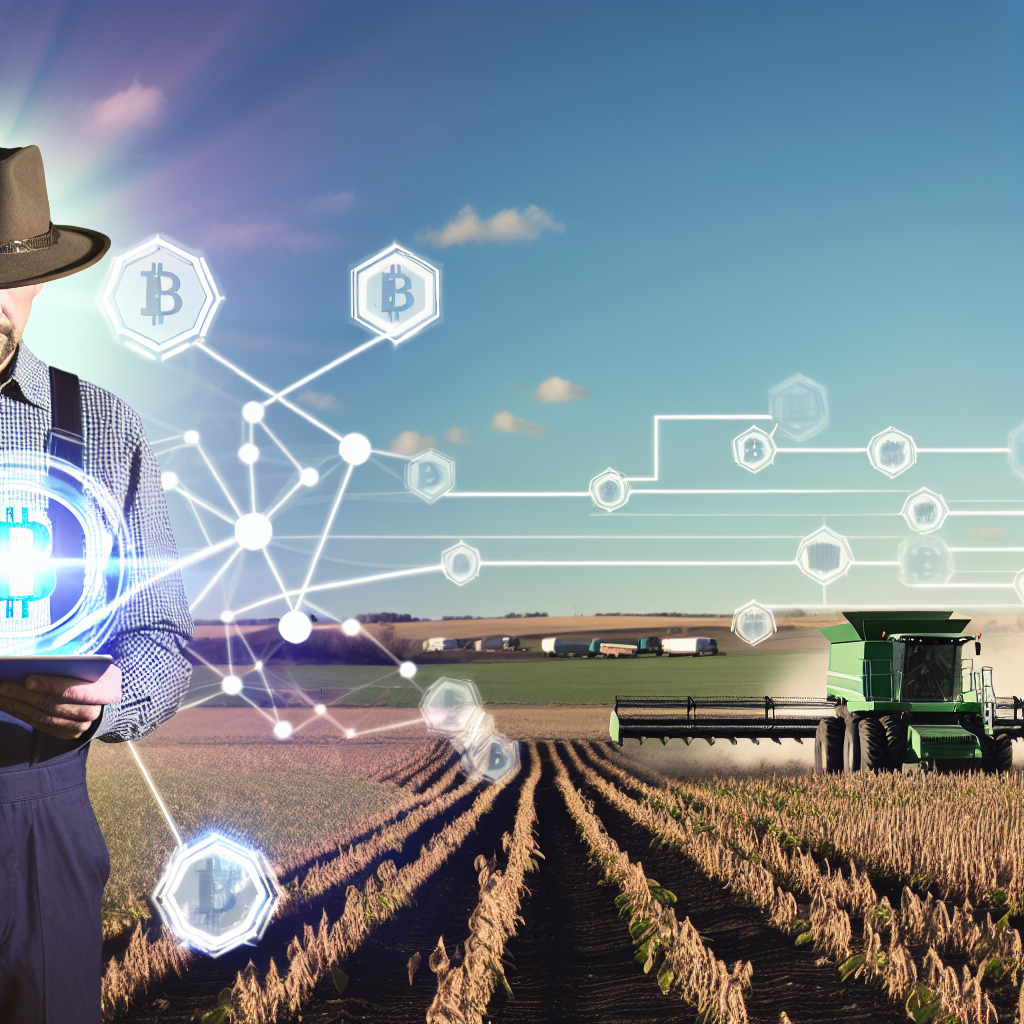
Security Features of Blockchain That Protect Against Fraud and Tampering
Decentralized Nature
Blockchain operates on a decentralized network of computers.
This structure eliminates control by any single entity.
As a result, it minimizes the risk of centralized fraud.
Immutability of Data
Once recorded, data on a blockchain cannot be easily altered.
This characteristic ensures that all transactions remain transparent and verified.
Consequently, tampering with transaction records is highly difficult.
Transparency Through Public Ledgers
Blockchain operates using public ledgers accessible to all participants.
Each transaction is visible and can be traced back to its origin.
This transparency enhances trust among supply chain stakeholders.
Cryptographic Security
Blockchain employs advanced cryptographic techniques for data protection.
These techniques secure transaction data from unauthorized access.
Moreover, they help maintain the integrity of the information recorded.
Smart Contracts for Automation
Smart contracts automatically execute transactions based on predefined conditions.
This feature reduces human error and potential manipulation.
Overall, it increases the reliability of the supply chain processes.
Track and Trace Capabilities
Blockchain provides robust tracking and tracing features for agricultural products.
Stakeholders can monitor the journey of goods from farm to table.
As a result, any discrepancies can be quickly identified and addressed.
Consensus Mechanisms
Transactions must be verified by multiple network participants before being recorded.
This consensus approach prevents unauthorized or fraudulent activities.
In essence, it ensures that only legitimate transactions are added to the blockchain.
See Related Content: Integrating Agri-Fintech Technologies For Smarter Farm Management
Potential Barriers to Adoption of Blockchain in Agriculture
Understanding Technological Challenges
Many farmers lack understanding of blockchain technology.
This gap creates hesitation in adopting the system.
Furthermore, infrastructure in rural areas can be inadequate.
Showcase Your Farming Business
Publish your professional farming services profile on our blog for a one-time fee of $200 and reach a dedicated audience of farmers and agribusiness owners.
Publish Your ProfileThis limits access to necessary technology for implementation.
Moreover, transaction speed and capacity may pose concerns.
Financial Constraints
Implementing blockchain can be costly for small farms.
These costs include software, hardware, and training expenses.
Access to financing for adopting new technologies can be limited.
Additionally, uncertainty about return on investment intimidates producers.
Regulatory and Compliance Issues
Existing agricultural regulations may not accommodate blockchain.
Farmers face uncertainties regarding compliance with new technologies.
Moreover, regulations can differ significantly between regions.
This creates confusion for farmers operating in multiple locations.
Data Privacy and Security Concerns
Farmers worry about the security of their data on public blockchains.
Privacy issues can hinder the sharing of sensitive information.
Additionally, data ownership rights remain a contentious topic.
All these factors lead to reluctance in full-scale adoption.
Resistance to Change
Many players in agriculture prefer traditional methods.
This resistance slows down the adoption of new technologies.
Additionally, older generations may struggle with technical skills.
Educating all stakeholders is crucial for successful implementation.
Lack of Standardization
Blockchain applications in agriculture are not standardized yet.
Without common protocols, integration becomes challenging.
Furthermore, multiple platforms can create interoperability issues.
These technical barriers can deter potential adopters.
Future Trends and Innovations in Blockchain for Agriculture
Enhancing Traceability
Blockchain technology vastly improves traceability in agricultural supply chains.
It enables consumers to track products from farm to table.
This transparency fosters trust and accountability among stakeholders.
Moreover, it helps in recalling unsafe products quickly.
Improving Efficiency
Smart contracts streamline transactions by automating processes.
These contracts execute automatically when conditions are met.
Farmers can save time on paperwork and negotiations.
Additionally, efficiency lowers operational costs significantly.
Supporting Sustainability
Blockchain facilitates sustainable practices in agriculture.
It allows for the monitoring of resource use and waste.
Consequently, farmers can optimize their input and reduce environmental impact.
This innovation promotes responsible farming techniques.
Financial Inclusion
Blockchain opens doors for smallholder farmers.
It provides them access to financial services and credit.
Through decentralized finance, farmers can secure funding more easily.
Thus, they can invest in technology and improve yields.
Collaboration and Data Sharing
Blockchain enables better collaboration among agricultural stakeholders.
Farmers, retailers, and consumers can share valuable data efficiently.
Showcase Your Farming Business
Publish your professional farming services profile on our blog for a one-time fee of $200 and reach a dedicated audience of farmers and agribusiness owners.
Publish Your ProfileThis shared information leads to improved decision-making.
Ultimately, it enhances productivity across the supply chain.
Adoption of IoT and AI Integration
The integration of IoT with blockchain is a promising trend.
IoT devices gather real-time data from the fields.
This data is securely stored on the blockchain for analysis.
AI can then interpret this data, offering actionable insights.
Such innovation improves farming practices and yields.
Additional Resources
Blockchain Technology for Agriculture: Applications and … – Frontiers
Improving Food Safety and Security via Blockchain Technology to …

